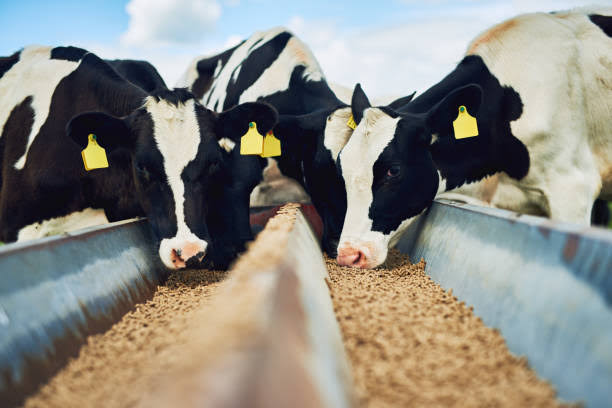
The Science Behind Balanced Diets for Domesticated Animals
Balanced diets are essential for the health, productivity, and longevity of domesticated animals. A well-formulated diet ensures the right mix of macronutrients, micronutrients, and water to meet an animal’s specific needs. This article explores the components of balanced diets, their significance, and practical ways to maintain proper nutrition for pets and livestock.
🐶 Pet Star
11 min read · 28, Jan 2025

Components of a Balanced Diet
A balanced diet for domesticated animals consists of six primary components:
1. Proteins
Proteins are the building blocks of life, composed of amino acids that are essential for growth, repair, and maintenance.
- Functions:
- Builds and repairs tissues, including muscles and organs.
- Produces enzymes, hormones, and antibodies.
- Supports reproduction and lactation.
- Sources:
- Animal-based: Meat, eggs, fish meal, and dairy.
- Plant-based: Soybeans, legumes, and grains.
- Deficiency: Leads to poor growth, weakened immunity, and reproductive issues.
2. Fats
Fats are a concentrated energy source, providing more than twice the calories of proteins and carbohydrates.
- Functions:
- Provides long-lasting energy.
- Facilitates the absorption of fat-soluble vitamins (A, D, E, K).
- Supports healthy skin and coat.
- Sources:
- Animal fats: Lard, tallow.
- Plant oils: Flaxseed, soybean, and sunflower oils.
- Deficiency: Results in a dull coat, low energy, and reduced reproductive performance.
3. Carbohydrates
Carbohydrates are the primary energy source, particularly for herbivores and omnivores.
- Functions:
- Fuels daily activities and metabolic functions.
- Provides fiber for gut health (important for herbivores).
- Sources:
- Simple carbohydrates: Fruits, root crops.
- Complex carbohydrates: Grains, hay, silage.
- Deficiency: Causes fatigue, reduced productivity, and reliance on protein for energy.
4. Vitamins
Vitamins are organic compounds required in small amounts for various physiological processes.
- Fat-soluble vitamins: A, D, E, K – Stored in the body’s fat reserves.
- Water-soluble vitamins: B-complex, C – Require regular intake as they are not stored.
- Functions: Enhance immunity, support growth, and facilitate metabolic reactions.
- Sources: Fresh produce, fortified feeds, and supplements.
5. Minerals
Minerals are inorganic nutrients crucial for structural and metabolic functions.
- Macrominerals: Calcium, phosphorus, potassium.
- Trace minerals: Iron, zinc, selenium.
- Functions: Strengthen bones, maintain fluid balance, and support enzyme function.
- Sources: Grains, greens, and mineral supplements.
6. Water
Water is the most important nutrient, facilitating digestion, temperature regulation, and waste elimination.
- Daily Requirement: Depends on the animal’s size, species, and activity level.
- Dehydration Signs: Lethargy, dry mucous membranes, and reduced feed intake.
Importance of Balanced Diets
1. Improved Health and Immunity
A balanced diet strengthens the immune system, reducing the risk of diseases and infections.
2. Optimal Growth and Productivity
Proper nutrition supports healthy development in young animals and maximizes productivity in livestock (e.g., milk production, egg laying).
3. Enhanced Reproductive Performance
Balanced diets promote fertility and healthy offspring in breeding animals.
4. Longevity
Animals receiving proper nutrition are likely to live longer, healthier lives.
Practical Tips for Maintaining Balanced Diets
- Know the Nutritional Requirements
- Different species and breeds have specific dietary needs.
- Life stages (puppy, adult, senior) influence nutrient requirements.
- Choose High-Quality Feeds
- Opt for reputable commercial feeds formulated for specific species.
- Check for balanced macronutrient and micronutrient content.
- Incorporate Variety
- Introduce a mix of grains, forages, and proteins to ensure all nutrient needs are met.
- Monitor Portions
- Overfeeding can lead to obesity, while underfeeding causes deficiencies.
- Use feeding guides or consult a veterinarian for portion recommendations.
- Regular Health Checks
- Monitor weight, coat quality, and overall behavior.
- Adjust diets based on changes in health or activity levels.
- Provide Clean Water
- Ensure constant access to fresh, clean water.
- Clean water bowls and troughs regularly to prevent contamination.
Common Challenges in Feeding Domesticated Animals
- Nutritional Imbalances
- Over-supplementation or poor-quality feeds can cause toxicity or deficiencies.
- Selective Eating
- Some animals may avoid certain feeds, leading to nutrient gaps.
- Economic Constraints
- High-quality feeds can be expensive, requiring cost-effective alternatives.
- Seasonal Variations
- Availability of certain feeds may fluctuate, impacting diet formulation.
Q1: Why is water considered the most important nutrient?
Ans) Water supports digestion, regulates body temperature, and removes waste. Dehydration can quickly lead to severe health issues.
Q2: Can animals rely solely on one type of feed?
Ans) No, a single feed source rarely provides all the required nutrients. A variety of feeds ensures a balanced diet.
Q3: How can I tell if my animal’s diet is unbalanced?
Ans) Signs include poor coat quality, low energy, weight changes, and reduced productivity. Regular vet checks can identify nutritional gaps.
Q4: What role do vitamins play in animal diets?
Ans) Vitamins support immunity, growth, reproduction, and metabolic functions. Both deficiencies and excesses can cause health problems.
Q5: How often should I adjust my animal’s diet?
Ans) Diets should be reviewed regularly, especially during life stage changes, pregnancy, or periods of illness.
Similar Articles
Find more relatable content in similar Articles

Virtual Vet Visits: Are Online Consultations Reliable?..
As pet healthcare embraces dig.. Read More

Pets and Mental Health: The Science Behind Emotional H..
Discover the profound impact o.. Read More

Composting Pet Waste: A Greener Way to Clean Up...
As pet ownership continues to .. Read More

Social Media for Pets: Turning Your Pet into a Digital..
From playful puppies to charis.. Read More
Explore Other Categories
© 2024 Copyrights by rPets. All Rights Reserved.